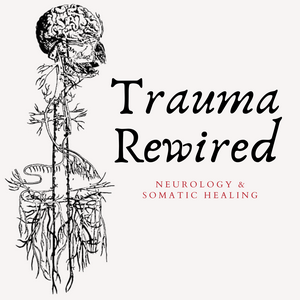Ready to break free from burnout and self-sabotage?Join The Capacity Gap Workshop, register FREE at https://rewirecapacity.com The fight response is often misunderstood as a personality flaw, but it’s actually a deeply wired survival adaptation shaped by past experiences and trauma. In this episode of Trauma Rewired, we explore the difference between healthy, time-bound anger and the chronic fight state, how they’re created in the brain and body, and why learning to process anger is essential for emotional safety and healthy connection. You’ll learn how the amygdala, hypothalamus, periaqueductal gray, insular cortex, and prefrontal cortex interact during a fight response, and how trauma can train the brain to see threat everywhere. We break down the health consequences of chronic fight, the relational patterns it creates, and why suppression of anger doesn’t make it go away — it stores it in the body. From personal stories to neuroscience, this conversation offers tools to recognize the signals of fight mode, regulate your state, and reclaim anger as a clarifying force for setting boundaries and protecting what matters — without living in constant defense mode. Timestamps 00:00 – Why Anger Matters and the Cost of Suppression 04:06 – Honoring Anger and Boundaries 06:06 – How Chronic Fight Shows Up in Life 09:45 – Early Conditioning and Nervous System Patterns 13:00 – Trauma, Parentification, and the Fight Response 15:43 – Impact on Relationships and Work 21:21 – The Neuroscience of the Fight Response 31:41 – Physical and Health Effects of Chronic Fight 39:28 – Anger vs. Chronic Fight: Key Differences 42:09 – Processing Anger Safely 49:36 – Boundaries, Regulation, and Aligned Action 53:38 – Final Takeaway: Fight as Pattern, Anger as Compass Topics Discussed in This Episode: The difference between healthy anger and the chronic fight response How trauma conditions the nervous system for constant defense The role of the amygdala, hypothalamus, PAG, insula, and PFC in fight mode How suppression of anger impacts physical and mental health Chronic fight patterns in relationships and work Tools for processing anger safely Why anger can be a clarifying force for boundaries Rewiring fight mode through neuroplasticity and somatic tools How parentification and early childhood experiences shape fight response The health consequences of chronic sympathetic activation 🔗 Resources: 🎯 Start Here Ready to break free from burnout and self-sabotage? Join The Capacity Gap Workshop, register FREE at https://rewirecapacity.com FREE 2-week nervous system training: https://www.rewiretrial.com Learn more about Neurosomatic Intelligence Coaching: https://www.neurosomaticintelligence.com 📺 Watch More Trauma Rewired Episodes YouTube Channel: https://www.youtube.com/@TraumaRewired 🤝 Connect with Us Instagram: https://www.instagram.com/trauma.rewired Facebook Group: https://www.facebook.com/groups/761101225132846 🌱 Exclusive Offer FREE 1 Year Supply of Vitamin D + 5 Travel Packs from Athletic Greens: https://www.drinkag1.com/rewired This episode was produced by ClipGrowth – Podcast Video Editing, SEO & YouTube Strategy https://ClipGrowthAgency.com Trauma Rewired podcast is intended to educate and inform but does not constitute medical, psychological or other professional advice or services. Always consult a qualified medical professional about your specific circumstances before making any decisions based on what you hear. We share our experiences, explore trauma, physical reactions, mental health and disease. If you become distressed by our content, please stop listening and seek professional support when needed. Do not continue to listen if the conversations are having a negative impact on your health and well-being. If you or someone you know is struggling with their mental health, or in mental health crisis and you are in the United States you can 988 Suicide and Crisis Lifeline. If someone’s life is in danger, immediately call 911. We do our best to stay current in research, but older episodes are always available. We don’t warrant or guarantee that this podcast contains complete, accurate or up-to-date information. It’s very important to talk to a medical professional about your individual needs, as we aren’t responsible for any actions you take based on the information you hear in this podcast. We invite guests onto the podcast. Please note that we don’t verify the accuracy of their statements. Our organization does not endorse third-party content and the views of our guests do not necessarily represent the views of our organization. We talk about general neuro-science and nervous system health, but you are unique. These are conversations for a wide audience. They are general recommendations and you are always advised to seek personal care for your unique outputs, trauma and needs. We are not doctors or licensed medical professionals. We are certified neuro-somatic practitioners and nervous system health/embodiment coaches. We are not your doctor or medical professional and do not know you and your unique nervous system. This podcast is not a replacement for working with a professional. The BrainBased.com site and Rewiretrail.com is a membership site for general nervous system health, somatic processing and stress processing. It is not a substitute for medical care or the appropriate solution for anyone in mental health crisis. Any examples mentioned in this podcast are for illustration purposes only. If they are based on real events, names have been changed to protect the identities of those involved. We’ve done our best to ensure our podcast respects the intellectual property rights of others, however if you have an issue with our content, please let us know by emailing us at
[email protected] All rights in our content are reserved This episode was produced by ClipGrowth - Podcast Video Editing, SEO & YouTube Strategy https://ClipGrowthAgency.com


